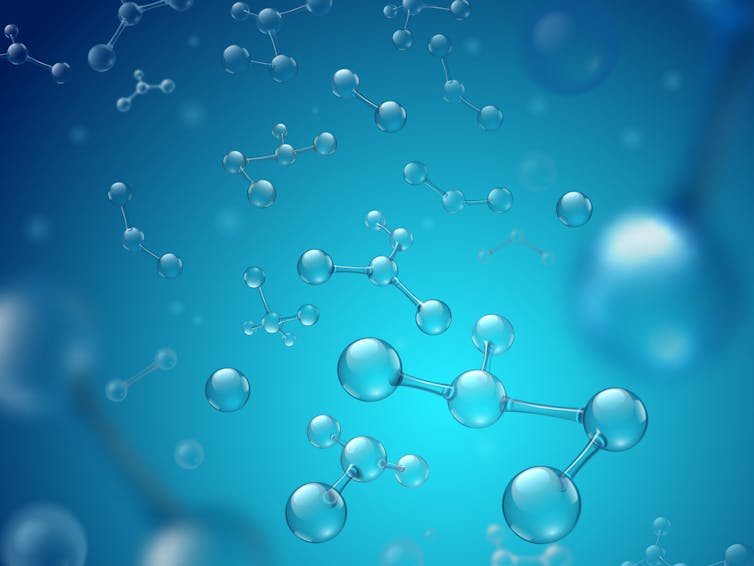Is hyaluronic acid as effective on skin as as skincare brands claim?
Lian Liu, University of Surrey
Hyaluronic acid has become a huge buzzword in the beauty industry, with everything from creams and cleansers to shampoos containing it. Often, these products are marketed to consumers with the promise that hyaluronic acid will boost hydration – important for keeping the skin looking its best.
Hyaluronic acid is ubiquitous in our organs and tissues, playing a crucial role in the function of our cells and tissues.
Hyaluronic acid has been in clinical use for decades, for example, as an injectable between joints to help lubricate cartilage. But at the turn of the century, cosmetic companies began using it as a moisturising ingredient in cosmetic products.
Topically, it’s thought that hyaluronic acid works by holding and retaining water molecules to hydrate the skin and restore elasticity, preventing wrinkles. When combined with sunscreen, hyaluronic acid may be capable of protecting the skin against ultraviolet radiation as it has antioxidant properties (meaning it prevents damage caused by oxidising agents, such as ultraviolet radiation).
One of the most frequent marketing claims used to sell hyaluronic acid is the long-held belief that hyaluronic acid holds 1,000 times its weight in water. This means it can maintain moisture and reduce moisture loss.
But this claim has been called into question recently, with numerous publications recently discussing the findings of a pre-print paper which suggests this claim is not true.
The authors of the pre-print, researchers from the University of California, looked into the molecule-binding properties of hyaluronic acid and water to test the claim that it can hold 1,000 times its weight in water.
To do this, the researchers created a solution containing 1g of hyaluronic acid and 1,000g of water (0.1% of hyaluronic acid), which was compared with just water. They then applied heat to both solutions, measuring the thermal changes that occurred. They found that there was not much difference in the changes that occurred in the 0.1% hyaluronic acid solution compared with the pure water. They therefore concluded that the long-held claim is not true.
These findings may have consumers wondering how well their hyaluronic acid products work if it doesn’t hydrate the skin as much as previously claimed.
How hyaluronic acid works on skin
While there’s no disputing the experimental results obtained, the conclusion on hyaluronic acid’s water-holding capacity does not apply to all forms of hyaluronic acids.
Hyaluronic acid comes in different molecular sizes. This pre-print only looked at one medium-sized hyaluronic acid molecule in their experiments. This means the results may only be true for products containing medium and smaller-sized hyaluronic acid molecules.

When hyaluronic acid interacts with water, its water-loving and water-hating parts lead to electrostatic repulsion. This enables large numbers of hyaluronic acid molecules to form networks, which look a bit like honeycombs, and expand.
The larger the hyaluronic acid’s molecule size, the more capable it is of forming these honeycomb structures – and also the more able it is to retain water relative to its weight.
Hyaluronic acid with larger molecular sizes will form these networks at a concentration of 0.1%, meaning it can hold 1,000 times its weight in water. Some very large molecules will even form these networks at a concentration as low as 0.05%. This means it can hold 2,000 times its weight in water.
It’s also worth noting that hyaluronic acid doesn’t just hold moisture and hydrate the skin. Because of its hydrating and antioxidant effects, it also promotes cell regeneration and stimulates collagen production. So hyaluronic acid’s benefits go beyond its ability to retain water.
Although this paper may have partially debunked one popular claim about hyaluronic acid’s moisturising abilities, that doesn’t mean you should stop using it. The research still shows there’s no doubt about hyaluronic acid’s moisturising abilities, which can leave skin softer, smoother and with fewer wrinkles. Plus, hyaluronic acid’s antioxidant effects promote the growth of new skin cells and collagen.
But if you want to make sure you’re getting the most effective product possible, look for one containing multiple weights of hyaluronic acid molecules (sometimes labelled as “triple weight”, “multiweight” or “multi-molecular weight”). Also, look for a product containing a minimum hyaluronic acid concentration of 0.1%.
This is because research suggests products containing a formulation of multiple sizes of hyaluronic acid molecules could be more beneficial for skin than formulations containing only one molecule size. This is partly due to smaller molecules permeating skin better, while the larger ones hold more water.
Lian Liu, Reader, School of Chemistry and Chemical Engineering, University of Surrey
This article is republished from The Conversation under a Creative Commons license. Read the original article.

